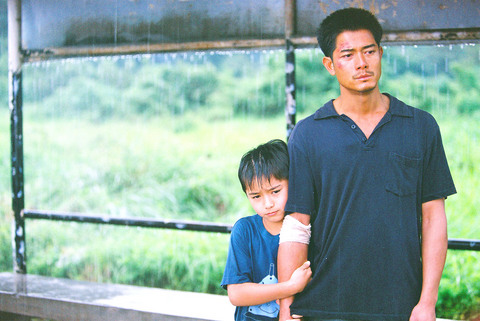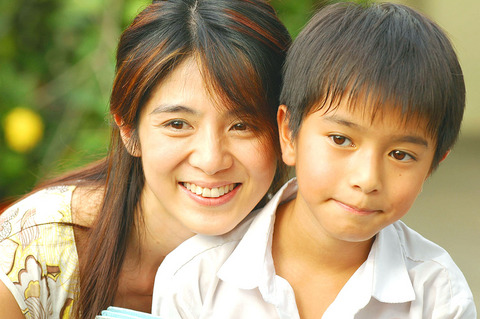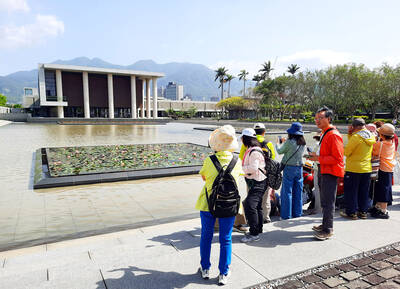A leading figure of Hong Kong New Wave cinema, director-writer Patrick Tam (譚家明) turned to film editing after his award-winning 1989 movie My Heart is That Eternal Rose (殺手蝴蝶夢) and made a distinguished career out of the switch with works such as Wong Kar Wai's (王家衛) Days of Being Wild (阿飛正傳, 1991) and Ashes of Time (東邪西毒, 1994) as well as Johnnie To's (杜琪峰) Election (黑社會, 2005). Seventeen years later, Tam returns to the director's chair with After This Our Exile (父子), a simple, yet resonant family drama in which the cast, led by singer-turned-serious actor Aaron Kwok (郭富城) and former idol Charlie Yeung (楊采妮), turn in arguably the most refined performances of their careers.
Kwok and Yeung play the Cantonese couple Sheng and Lin (presumably from Hong Kong) living in Malaysia. A onetime ladies' man, Sheng is a compulsive gambler with a hot temper born out of his frustration with life. Sensing that her lot in life will never improve, Lin escapes from her abusive relationship with Sheng and leaves their son (played by Gow Ian Iskander) with the father.
Down and out, the two are forced into a vagabond lifestyle while the boy steals to support them. Eventually, the boy is caught and sent to a juvenile detention center where a visit from the father ends in a violent denouement. A coda set 10 years later sees the son, now a young man, returning home. On his way, from some distance, he sees an old man, could be his father, holding hands with a woman.

PHOTOS COURTESY OF SERENITY INTERNATIONAL
In the skilled hands of Taiwan's acclaimed cinematographer Lee Ping-bing (李屏賓), the film is visually vigorous and is attuned to the rustic, tropical locale of Malaysia that becomes a character rather than a backdrop. The significant play between light and shade, the lush, rich-colored lighting and the attention to detail in art direction breathes life into the straightforward storyline; such technical excellence doesn't alienate audiences from the engaging human drama unfolding in the well-constructed slow paced narrative, punctuated by sentimental music.
The father-and-son drama challenges the actors, who turn in fine performances. Yeung manages to bring out a convincing depiction of an abused, weary woman while Taiwan's Kelly Lin (林熙蕾) is the picture of dramatic tension as a prostitute with whom the father has a brief fling. Sharing a great on-screen chemistry with Kwok, the nine-year-old child actor Gow doesn't come off as a blubbery, irritating or precocious kid but a lovable boy whom audiences can sympathize with early on in the film.
Yet Kwok is the true star of the film, which sees the teen heartthrob morph into a serious actor. Taking on the unsavory role, which may be the biggest gamble of his career, Kwok pulls off the uneducated, uncouth, seedy father with subtle nuances, body language and melodramatic twists. As the character gradually develops, we actually learn to understand the emotionally troubled man who is unable to show anyone his real affection or fear of being abandoned; he is too weak to stop the people he loves from leaving him.

Though the film focuses on the father-and-son relationship that seems repetitive and stretched at times, Tam's aesthetic sensibility is most pronounced in his candid, yet tender portrait of love and lust as the beautifully shot sex scenes arouse erotic tension rarely found in Chinese-language films and serve as a reminder of what the director excelled at in his previous works such as the 1982 classic Nomad (烈火青春).
Garnering honors from the 43rd Golden Horse Awards for Best Actor, Best Supporting Actor and Best Picture, and Best Artistic Contribution Award and Best Asian Film from the 19th Tokyo International Film Festival, After This Our Exile eloquently proves that a straightforward story, albeit outdated in the eyes of stylish thrill seekers, can stand out among its peers with its sober human drama.

When the South Vietnamese capital of Saigon fell to the North Vietnamese forces 50 years ago this week, it prompted a mass exodus of some 2 million people — hundreds of thousands fleeing perilously on small boats across open water to escape the communist regime. Many ultimately settled in Southern California’s Orange County in an area now known as “Little Saigon,” not far from Marine Corps Base Camp Pendleton, where the first refugees were airlifted upon reaching the US. The diaspora now also has significant populations in Virginia, Texas and Washington state, as well as in countries including France and Australia.

On April 17, Chinese Nationalist Party (KMT) Chairman Eric Chu (朱立倫) launched a bold campaign to revive and revitalize the KMT base by calling for an impromptu rally at the Taipei prosecutor’s offices to protest recent arrests of KMT recall campaigners over allegations of forgery and fraud involving signatures of dead voters. The protest had no time to apply for permits and was illegal, but that played into the sense of opposition grievance at alleged weaponization of the judiciary by the Democratic Progressive Party (DPP) to “annihilate” the opposition parties. Blamed for faltering recall campaigns and faced with a KMT chair

Article 2 of the Additional Articles of the Constitution of the Republic of China (中華民國憲法增修條文) stipulates that upon a vote of no confidence in the premier, the president can dissolve the legislature within 10 days. If the legislature is dissolved, a new legislative election must be held within 60 days, and the legislators’ terms will then be reckoned from that election. Two weeks ago Taipei Mayor Chiang Wan-an (蔣萬安) of the Chinese Nationalist Party (KMT) proposed that the legislature hold a vote of no confidence in the premier and dare the president to dissolve the legislature. The legislature is currently controlled

Dull functional structures dominate Taiwan’s cityscapes. But that’s slowly changing, thanks to talented architects and patrons with deep pockets. Since the start of the 21st century, the country has gained several alluring landmark buildings, including the two described below. NUNG CHAN MONASTERY Dharma Drum Mountain (法鼓山, DDM) is one of Taiwan’s most prominent religious organizations. Under the leadership of Buddhist Master Sheng Yen (聖嚴), who died in 2009, it developed into an international Buddhist foundation active in the spiritual, cultural and educational spheres. Since 2005, DDM’s principal base has been its sprawling hillside complex in New Taipei City’s Jinshan District (金山). But